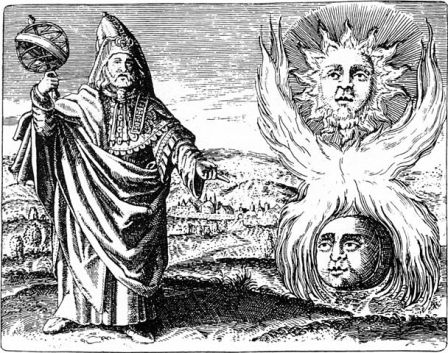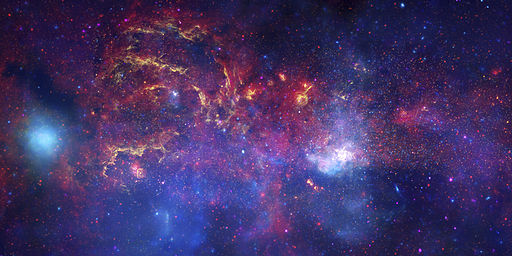In modern day, the most credible way to understand nature and the universe is through science. Science is defined as:
“the intellectual and practical activity encompassing the systematic study of the structure and behaviour of the physical and natural world through observation and experiment.” (Oxford Dictionary)
The root of the word science originates from the latin, scientia, which means knowledge. Knowledge comes from the Greek word, Gnosis, signifying knowing through observation or experience. The scientific method is a way of acquiring knowledge through collection of data, observations, experimentation and formulating testable hypotheses.
But, science is not the only way of acquiring knowledge.
Types of knowledge
Knowledge that is obtained through sense-perception is called a posteriori or empirical knowledge. For empiricists, there is no other kind of knowledge. On the other hand, rationalists believe that true knowledge can only be discovered a priori, or through deductive reasoning and logic, which are processes that are hardwired in the human brain and independent of sensory experience.
Immanuel Kant blended the empirical and rationalist perspectives: he said that knowledge may begin with experience but it does not arise from experience. According to Kant, a priori knowledge is transcendental and based on the form of all possible experience, while a posteriori or empirical knowledge based on the content of experience.
Carl Jung, coined the term “Collective Unconscious”, which signifies the unconscious, impersonal universal mind shared by all humanity, which often communicates with symbols and archetypes. Information stored in the collective unconscious can be considered a source of knowledge, which Jung argues also has a profound influence on sensory experience.

Interestingly, the ancient art form, alchemy, is central to Jung’s idea of the collective unconscious. Much of the vast array of symbols used in alchemy draws from the Collective Unconscious of the West.
The alchemists’ saying, “As above, so below.” means that what is happening in the world is a symbolic reflection of what is happening inside of ourselves. Alchemy has a dual nature: it is both a chemical process with a parallel mystical component. For example, the magnum opus (“great work”) is discovering the Philosopher’s Stone, or a substance that can turn lead into gold. This is commonly taken literally and thus misinterpreted: it means turning the lead of the self into spiritual gold, and is analogous to the eastern concept of enlightenment or awakened consciousness.

In Gnosticism and in Christian, Islamic and Jewish mysticism, gnosis generally means spiritual knowledge and is linked to “insight”, or the intuitive knowing of oneself. The Gnostics were a collection of ancient religions (1st – 2nd century AD) that defined gnosis as primarily self-knowledge, the secret to attaining the goal of enlightenment.

Hindu knowledge
For the Hindu’s, knowledge of self or self-realization is Atman jnana. Jnana signifies knowledge, as acquired through meditation. Atman, oneself or the mystery of our life, is identical with ultimate reality or Brahman. For Tibetan Buddhists, jnana means pure awareness that is free of conceptual encumbrances. It is above reason and can never be attained by reason alone.
The Upanishads, ancient Hindu texts written somewhere between 1000 BC – 500 BC, reveal the nature of ultimate reality and freedom from samsara (the cycle of life and death) through self-realization (Atman jana).
The Katha Upanishad is the story of a boy, Nachiketa who meets Yama, the Hindu lord of death, who reveals:
“when the consciousness of Atman manifests itself, man becomes free from the jaws of death”.

In the following quote, Yama brings together, empiricism (senses, object and mind), rationalism (pure reason), Kant, Jung, the Alchemists and the Gnostics (Atman and Avyaktam) and the Cosmic Soul:
“Beyond, the senses are their objects, beyond the object is the mind. Beyond the mind is pure reason, and beyond pure reason is the Spirit in man (Atman).
Beyond the Spirit in man (Atman) is the Spirit of the Universe (Avyaktam), and beyond is Purusha, the Cosmic soul. There is nothing is beyond Purusha; this is the goal, the highest Road.”
Reconciling knowledge
Science is a reliable of way of understanding the physical and material realm. Nevertheless, scientific innovation, invention and discovery often arise from, imagination intuition, dreams and flashes of insight (E.g. Albert Einstein, Neils Bohr, Archimedes, Mendelev etc). Creative ideas seemingly come out of the ether, but can then be empirically tested and verified scientifically.
Both a priori knowledge, such as reason, intuition and logic, and a posteriori, or empirical knowledge, are necessary for man to construct an understanding of life and the universe. In most mystical and spiritual traditions, the secret to ultimate knowledge is “knowing thyself” or self-realization, which cannot be obtained through reason or empirical methods alone.
Mystical experience is necessary to reveal the inner nature of things while science is necessary for modern life.


[…] Source: Can knowledge come from within? or A brief history of knowledge […]
LikeLike
Opened up a whole new level of wisdom and knowledge. I assumed I couldn’t teach based on feeling I wasn’t equipped the more I read and studied I surprised myself. It’s like a light being turned on. Thanks for the enlightenment.
LikeLike
[…] of perspective and the ability to make sound judgments about a subject. Wisdom emphasizes intuitive self-knowledge and clarity. It prioritizes cultivating spaciousness via practices that increase discerning […]
LikeLike